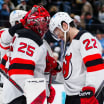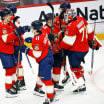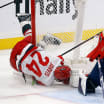NHL.com's Q&A feature called "Five Questions With …" runs every Tuesday. We talk to key figures in the game and ask them questions to gain insight into their lives, careers and the latest news.
The latest edition features Metropolitan Riveters captain and former U.S Women's National Ice Hockey Team member Michelle Picard.
Photos courtesy Troy Parla/NWHL
Five Questions with Michelle Picard
Captain of NWHL Riveters on growing up with Olympic dreams, being role model
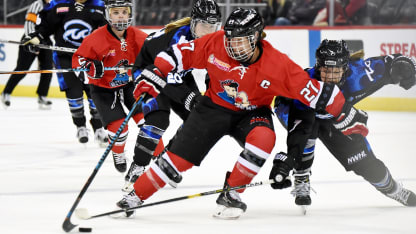
© Troy Parla
Michelle Picard not only has become a professional hockey player, but leader among peers as captain for the Metropolitan Riveters of the National Women's Hockey League and role model for young girls with aspirations of playing the sport one day.
RELATED: [Gender Equality Month: Girls and Women in Hockey]
She became hooked on hockey the moment she saw older brother Tim playing on the frozen pond behind their home in Taunton, Massachusetts.
"I was basically born on a rink," Picard said. "There were woods behind our yard, it was more like a swamp, but when it froze over it was nice. I'd play out there for hours and then play at the local rink. It was sort of a family thing we did, and I fell in love with it, stayed with it all the way.
"I was 9 years old when I started telling everyone in my family that I wanted to be a hockey player and the best thing about it was no one laughed at me. They all supported me, encouraged me, and that was so important."
Her resume is impressive.
The 25-year-old defenseman was a member of the U.S Women's National Team for five years, earning a gold medal three times at the Women's World Championship (2013, 2015, 2016), and a silver medal at the 2012 Women's World Championship, and 2014 Sochi Winter Olympics.
She graduated from Harvard University with a degree in anthropology and played Division I hockey for four years, serving as co-captain her final two seasons (2014-16). She has played for the Riveters the past three seasons, winning the Isobel Cup as NWHL champion last season when she was also presented the NWHL Foundation Award as the player most actively applying the core values of hockey to her community as well as growing and improving hockey culture.
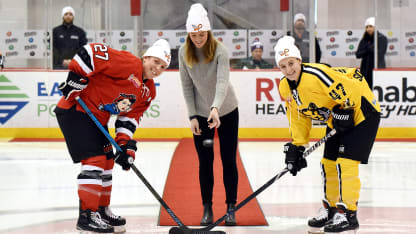
Last month, she represented the United States against Canada during the three-game 2019 Rivalry Series.
As an active recruiter of girl's hockey players in Newark, Picard and her Riveters teammates and the New Jersey Devils are teaming up to establish a Learn to Play program exclusively for girls that will take place at the RWJBarnabas Health Hockey House at Prudential Center, April 7-May 19. For more information and to register, visit newjerseydevils.com/learntoplay.
Here are Five Questions with … Michelle Picard:
At what point did you feel confident enough to say you wanted to become an Olympic hockey player?
"Professional hockey wasn't a reality until my senior year of college (2015-16) when the NWHL became the first paid women's pro league in North America but playing in the Olympics and winning a gold medal was a dream ever since I watched the 2002 Torino Winter Games. I was a little bit too young in 1998 to know what it meant but watched in 2002 and from that point said that's where I want to be and that's what I want to do, so that was my dream. When I went to Noble & Greenough School in Massachusetts we had five seniors during my eighth-grade year and four of them went on to Ivy League schools to play hockey. At that point, I was like, 'Wow, I can also get a great education out of this.' So that's when it became a two-part dream for me; playing college hockey and playing in the Olympics."
What does it mean for you to see so many young girls excited to watch you play?
"It's so much fun for me because I remember doing that not too long ago. It's a constant reminder of why we do this and why we still play. It's also a reminder to be good role models for them because, yes, the sport is important, but who we are and what we do off the ice is 10 times more important. My message for anyone wanting to try hockey is to stick with it for a little bit. Really give it a try and don't let just one practice be your deciding moment for it all and if you're really wanting to play with just boys, the cool thing is once you're out on the ice it really doesn't matter once you're out there, boys, girls, you're just hockey players and once you can sort of get over that hurdle the sport becomes a lot more fun.
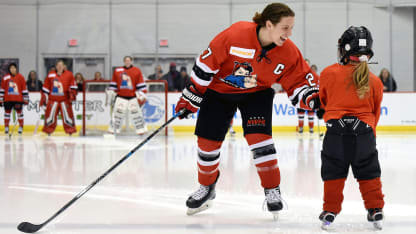
What do you do outside of playing for the Riveters?
"Since I was back into the women's national team pool, I had to leave teaching and now do a lot of training and coaching. I coach the New Jersey Colonials (in Morristown, New Jersey) and for Hockey in New Jersey. It's great trying to help get more girls playing, so I enjoy volunteering to make it happen. It's a little bit tougher in season because of time, but in the spring they have practices at RWJBarnabas Health Hockey House 4-to-5 days a week. I get to coach and work with kids who have never played before or have a couple years of experience. The organization helps provide equipment and ice time. Teaching those kids coming out for the first time is probably my most favorite part of being involved in hockey. There are between 30 and 60 kids per age group depending on if they're beginners or returnees. They have a house league where they get to play against each other and I've also got a couple of travel teams who will play against other teams in New Jersey."
How memorable was the three-game 2019 Rivalry Series against Canada (Feb. 12-17)?
"It was incredible. The fans were amazing and there was a lot of stuff going on with the young girls in the stands, so they got to watch us play. To be on that stage with that much attention was great. We usually don't get something like this in non-Olympic years so to just get that support already shows our sport is growing. For us, we just have to continue bringing out our best every time we play. We have to give the fans a good showing because we're building, and any sort of a lull in that can be really detrimental. It's on us to keep providing a good product and it's on people to show up and give it a try. Even if you haven't watched women's hockey, just remember that it's hockey. People have to just give it a try."
Did you get goosebumps watching U.S. Olympians Kendall Coyne Schofield and Brianna Decker participate in the 2019 NHL All-Star Skills competition?
"It gave me chills. I knew how fast she was because I played against her when she played for Northeastern and I was at Harvard for so many years, so I knew she was fast and that she would do well. I didn't know quite how well, but it was really no surprise. I'm just so happy that, on that stage, she was able to skate the way she really skates. That wasn't a one-time thing, either. She'll do that over and over again. I'm really proud of her and same thing with Brianna Decker; she's the best passer in the world. I'm just really glad they were able to do that. I hope it was a breakthrough. I think people's eyes are now opening that we have some phenomenal players and it doesn't matter if they're male or female. Hopefully, being on that stage, really helps our sport but at the same time we have to keep building and keep going."

